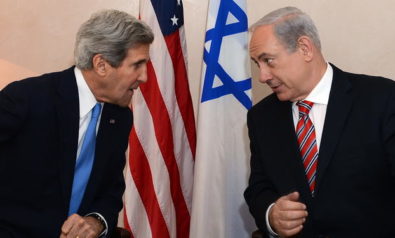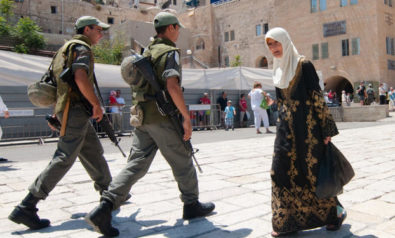Though peace talks between Israelis and Palestinians started nearly 20 years ago, a permanent and lasting peace has failed to materialize. This lack of progress has created an environment for violence, radicalism and disparity by both sides.
There are multiple reasons behind the lack of success in reaching a final peace agreement between the Israelis and Palestinians. The Declaration of Principles (Oslo) 1993 came as a result of talks between the State of Israel and the Palestine Liberation Organization (PLO) to end decades of confrontation and conflict. The aim was mutual recognition, along with peaceful, fair and permanent compromise, and "historic reconciliation" as stated in the agreement. In principle, the declaration produced the establishment of the Palestinian Authority (PA) to administer the areas under their sovereignty until both sides reached a full, comprehensive peace agreement. At the time, both parties agreed to continue the peace talks to achieve a permanent settlement after a transitional period of five years from 1994-1999. During this period, the permanent status issues would be resolved: Palestinian refugees, borders, Jerusalem, water, Israeli settlements in the Occupied Territories, and security.
Though negotiations between the two parties continued, with some ups and downs, it did not lead to concrete steps towards a peace agreement. The transitional period was extended into fifteen years without any progress towards a fair, comprehensive and permanent peace deal due to a number of obstacles.
Israeli Settlements in the Occupied Territories
Since its occupation of the West Bank, Gaza, and East Jerusalem in 1967, Israel has been determined to build "facts on the ground". Tel Aviv has continued to construct and expand settlements in the West Bank and East Jerusalem, along with building the separation wall on Palestinian land that has resulted in Israel drawing new borders. Settlement in the Occupied Territories has undermined any efforts to reignite the peace process as a Palestinian state has become almost impossible. The 1967 borders no longer exist due to the expansion of Israeli settlements, and the absence of the international community in pressuring Israel to stop its confiscation of Palestinian land in the Occupied West Bank and East Jerusalem.
The Israeli settlements in the Occupied Territories are considered by the US, EU and many other international actors as one of the main obstacles in reaching a lasting peace agreement between the Israelis and Palestinians. In the era of the late Palestinian President Yasser Arafat, the PA raised the slogan of "No peace with settlement" to reflect the position of rejecting the presence of the outposts in the West Bank.
Despite Israel's withdrawal from the Gaza Strip in 2005, and the dismantling of all the settlements in the Palestinian territory, along with the evacuation of nearly 8,000 settlers, the withdrawal was unilaterally finalized without coordinating with the PA. Israel remained in charge of Gaza's borders, energy and import-exports, as well as coastline and airspace, and the right to initiate military procedures at will; clearly preserving their influence in Gaza as the ruling power.
Moreover, following the Gaza withdrawal, settlement construction escalated in the West Bank. The settlements in the Occupied Territory reached 124 with 501,000 settlers living there. The Palestinians consider the settlements as illegitimate and demand that construction and expansion acts must stop.
Israel continues with its settlement policies despite the International Court of Justice ruling in July 2004 that: "Israeli settlements in the Occupied Palestinian Territory, including East Jerusalem, are illegal and an obstacle to peace and economic and social development, and its establishment is a violation of the international law." A recent report by the UN Human Rights Council stated that Israel "must immediately initiate a process of withdrawal of all settlers." Palestinian negotiators stipulate that in order for them to return to negotiations, Israeli settlement construction must stop. However, Israel continues to reject the demand.
The Separation Wall
The Apartheid Wall (by the Palestinian label) or the security barrier (according to the Israeli definition) is an additional impediment to achieving peace. The wall extends 700 kilometers long from the north to the south of the West Bank along the Green Line. According to the Israeli human rights organization B'Tselem, the wall seizes approximately 8.5% of the West Bank between the wall and Israel (beyond the Green Line of the 1967 borders).
Israel claims that the wall is necessary to protect Israeli civilians from Palestinian attacks. Yet, evidence on the ground indicates an Israeli attempt to rob more land from the West Bank since it deviates from the Green Line and into the Occupied Territory. In fact, 90% of its construction takes place within the West Bank rather than in between Israel and the Occupied Territories. The international community, from the UN to human rights organizations, view this barrier as a violation of international law.
"No Palestinian Partner in Peace"
Israel's claim that there is no Palestinian partner in the peace process has often been used by several Israeli politicians to justify the lack of progress in talks. This rhetoric emerged strongly in the era of former Israeli Prime Minister Ariel Sharon, who long insisted that there was no Palestinian partner for peace. Sharon employed weighted procedures such as the unilateral separation from the Gaza Strip in 2005. At the time, before the Likud Party conference in Tel Aviv, he said: "If it appears that there is no partner on the part of the Palestinians, we will isolate ourselves from them politically and financially."
However, some Israeli politicians, such as the former Prime Minister Ehud Olmert, have accused the Benjamin Netanyahu government of evading a political solution through the "no Palestinian partner in peace" claim. In addition, Olmert, Tzipi Livni, the former president of the Kadima party, asserted that the Netanyahu government does not tell the truth to the Israeli public in claiming that there is no Palestinian partner in the peace process.
Israel is convinced that negotiations will not be possible as long as there is a divided Palestinian political system. In fact, it refuses to have Hamas as its negotiating partner for peace owing to the no recognition of Israel by Hamas , preferring talks with the Palestinian President Mahmoud Abbas instead.
It was the signing of the Oslo agreement in 1993, through which the idea of a two-state solution certified the justification of a negotiated end to the Israeli-Palestinian conflict; thus opening negotiations between the PLO and Israel. This attempt in resolving the conflict paved the way for the mutual agreement of the Israeli government and the PLO. Yasser Arafat, the head of the PLO and Palestinian Authority at the time, promoted this two-stage process that he believed would undertake the recognition of Palestine as an independent state. In accordance, Israel was also in favor of having the PLO as a genuinely acknowledged peace partner.
Palestinians are now even more open to resuming peace talks with Israel particularly after being presented with the status of a non-member observer state by the General Assembly at the United Nations on November 29, 2012.
Divided Palestinians
The bloody conflict between Fatah and Hamas, which followed the victory of Hamas in the Palestinian legislative elections in 2006 and reached its peak in 2007, caused a political and geographical rift. Consequently, the Gaza Strip was dominated by Hamas, and the West Bank remained under the rule of the PA and Fatah.
This political division has led to the weakening of the Palestinian political system, creating inconsistency in policies and attitudes, while triggering a crisis within the Palestinian representation. It has led to the formulation of two separate governments in the two areas: the PA in the West Bank and the Hamas government in the Gaza Strip. At the political level, the PA in the West Bank stuck to its known political positions, and continued to engage in peace talks with Israel despite the rift that hit the Palestinian divide.
There have been many attempts to end the division between Fatah and Hamas, but all initiatives have so far failed. This has indeed reflected on the difficulty of the Palestinian political situation, and its power both locally and internationally.
Moreover, Israel has repeatedly used this disunity to justify the absence of a Palestinian partner in peace. The Palestinian internal division does contribute strongly to impinge on possible peace-talks. The fragmentation of the Palestinian political system fuels the Israeli position, which argues that the PA does not represent all Palestinians. While the PA has continued peace talks with Israel, Hamas rejects it entirely. For example, when negotiations resumed between President Abbas and Olmert, Hamas portrayed the negotiations as "absurd" and considered the step a crime against the Palestinian people.
The internal Palestinian division was, and still is, an obstacle to achieving peace because it plays a role in weakening and dispersing the Palestinian political unity making it vulnerable to regional and international interactions.
Palestine’s divide between both Hamas in Gaza and Fatah in the West Bank, has given way for the Israeli justification in holding back from its commitment to peace terms. Ending the division between the Palestinians is essential in order to reactivate peace talks. Ending the Palestinian divide is not only in the best interest of the Palestinians themselves, but also in achieving a lasting peace with the Israelis. It is without a doubt essential for both Israel and the Palestinians to follow through with negotiations on the peace process. Such an outcome will allow for stability and security in the Middle East.
The primary step in disrupting this endless cycle of aggression is to attain national reconciliation between both Hamas and the Palestinian Authority. The unification of the Palestinian representation requires the constitution of presidential and legislative elections held six months after the Palestinian Unity Government. Only then will the newly elected leadership of Palestine proceed in resuming peace talks with Israel that ought to be mediated out by the international community.
Author's Note
With Palestine recently being accorded the status of “non-member observer state” by the UN General Assembly, there is much to be discussed. Although Palestinian officials are much more eager in resuming peace talks with Israel, they are nonetheless threatening to consider referring Israel to the International Criminal Court (ICC), if it proceeds in any acts of assault against the Occupied State of Palestine. Hence, if Israel insists on rejecting the engagement of the Fourth Geneva Convention concerning the existence and expansion of Israeli settlements in the West Bank and East Jerusalem, now in violation of international law, the Palestinians will thus be prompted to file a complaint against Israel with the ICC, if not the International Community.
The views expressed in this article are the author's own and do not necessarily reflect Fair Observer’s editorial policy.
Image: Copyright © Shutterstock. All Rights Reserved
Support Fair Observer
We rely on your support for our independence, diversity and quality.
For more than 10 years, Fair Observer has been free, fair and independent. No billionaire owns us, no advertisers control us. We are a reader-supported nonprofit. Unlike many other publications, we keep our content free for readers regardless of where they live or whether they can afford to pay. We have no paywalls and no ads.
In the post-truth era of fake news, echo chambers and filter bubbles, we publish a plurality of perspectives from around the world. Anyone can publish with us, but everyone goes through a rigorous editorial process. So, you get fact-checked, well-reasoned content instead of noise.
We publish 2,500+ voices from 90+ countries. We also conduct education and training programs
on subjects ranging from digital media and journalism to writing and critical thinking. This
doesn’t come cheap. Servers, editors, trainers and web developers cost
money.
Please consider supporting us on a regular basis as a recurring donor or a
sustaining member.
Will you support FO’s journalism?
We rely on your support for our independence, diversity and quality.












Comment